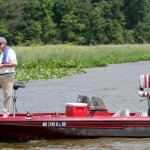Is A Casino Riverboat a Vessel Under the Jones Act?
An injury to a worker aboard a casino riverboat in Lake Charles is making headlines in the world of admiralty law. It’s an issue our maritime personal injury practice is following closely here at Joseph Joy and Associates in Lafayette. Personal injury attorney Joseph “Buzzy” Joy worked offshore for many years before he began his law practice, including working on supply boats, crew boats and rigs. He understands the perils of working offshore and the many ways that individuals can be negligently injured. He now protects the rights of injured seamen in federal Jones Act claims.
In Caldwell v. St. Charles Gaming Co., the Louisiana Court of Appeals for the Third Circuit, ruled last month that a riverboat was a “vessel” for Jones Act purposes. Why is this significant?
Because if upheld, it could expand the reach of the Jones Act. Typically, land based employers are immune under the state workers’ compensation act or Longshore and Harbor Workers’ Compensation Act (LHWCA). However, Jones Act seamen are not barred in any way from bringing a Jones Act claim against their employer or the owners of the vessels. Even individuals injured while working high-risk jobs on floating vessels can bring a Jones Act claim for their injuries caused by their employer’s negligence, an unseaworthy vessel or their employer’s failure to provide sufficient medical care.
In Caldwell, Plaintiff Don Caldwell, was injured while operating a scissor lift on the Grand Palais Casino (Grand Palais) riverboat casino moored in Lake Charles. He and his wife filed suit against his employer, the gaming company under the Jones Act. The gaming company defended by arguing the plaintiff was not a Jones Act seaman at the time of the incident, because he had no connection to a vessel in navigation that was substantial in nature and was never exposed to the perils of the sea.
A motion for summary judgment was denied at the trial court level and a three-judge panel of the 3rd Circuit agreed. But the plaintiffs went back to the appeals court asking for the entire Third Circuit Court to review the matter en banc, ie, together. The court agreed to an en banc review and held that the riverboat casino could be considered a vessel for purposes of the Jones Act. Here’s how they reached that decision.
On their initial appeal, the three judge panel found that the Grand Palais was not a vessel under general maritime law, reasoning that the Grand Palais’ primary purpose was dockside gambling. For more than sixteen years, it had not been engaged in any maritime activity and had been moored at the same location with all operations required for its gaming activities operated via land-based services. While it was possible the Grand Palais could be returned to service as a vessel; the three-judge appellate panel felt that the evidence established that for more than sixteen years, it had been indefinitely moored to provide for and maintain its primary purpose of riverboat gaming. Thus, although the Grand Palais was originally designed to transport people over water, the panel ruled that as a result of changes to its physical characteristics, its purpose, and its actual function over the past sixteen years, the riverboat casino could no longer be considered a vessel for Jones Act purposes.
But that ruling changed drastically in a majority opinion published on July 3, 2019, after an en banc review by the full court. The admiralty law team at Joseph Joy and Associates found the excerpts below persuasive:
The undisputed facts, the Plaintiffs argue, reflect that the Grand Palais has not been removed from navigation, laid up, or mothballed. The Plaintiffs urge that the defendant spends considerable time and expense to ensure that the vessel remains capable of operating as required of all riverboat casinos in Louisiana. La.R.S. 27:44.1. The witnesses, the Plaintiffs add, agree that the condition of the Grand Palais has not materially changed since it ceased daily excursions in 2001, and that it was capable of navigation at the time Don was injured, April 9, 2015. The Grand Palais, connected to the dock by temporary connections and gangways designed to be lifted and retracted, could be made ready to sail in thirty minutes.
The defendant does not dispute that the Grand Palais was a vessel prior to August 2001. Therefore, the Plaintiffs contend that it remains a vessel until it is removed from navigation. At the time of the accident, the Grand Palais had not been disabled, removed from the water, or sunk to the bottom of the lake, enclosed in a cofferdam. The Plaintiffs add that the defendant works diligently to maintain the Grand Palais in a fully-operational condition as required by law.
No doubt the defendant gaming company will appeal to the Louisiana Supreme Court. We will keep you updated. In the meantime, if you are a loved one sustained a personal injury on board a vessel, boat, or rig, contact the personal injury lawyers at Joseph Joy and Associates at 337-232-8123.




